
Why U.S. Ambassador Michael Gonzales Became an Unlikely Hero
U.S. Ambassador to Zambia, Michael Gonzales, has recently captured global attention for his heartfelt reaction during a press conference, revealing a $50 million cut in vital aid due to rampant corruption and theft of medical supplies intended for the Zambian people. Gonzales, visibly emotional, explained that this financial decision came not from indifference but from a deep sense of responsibility and compassion for those affected by the misappropriation of essential medicines.
The Context of the Aid Cut: A Distressing Reality
Between 2021 and 2023, an alarming investigation conducted by Gonzales's team uncovered systematic theft involving over 95% of pharmacies in Zambia selling medications intended for the needy. This appalling finding was not just an isolated incident; it painted a grim picture of organized criminality involving influential figures in Zambian society. The theft's depth highlighted a critical issue: while aid promised hope and health, it was being hijacked by corruption, with significant impacts on vulnerable populations.
The Emotional Toll on Ambassador Gonzales
During his press conference, Gonzales articulated the profound emotional conflict he experienced. "I view this as a heart-wrenching worst-case scenario," he stated, expressing sorrow over the fact that it would be impoverished families and children, rather than affluent officials, who would suffer the most. His tears reflected not only a personal loss but also the weight of accountability he felt for the U.S. taxpayer and those in Zambia less fortunate.
The Broader Implications of Healthcare Aid in Zambia
This unfortunate situation spotlights a broader discussion surrounding international aid, healthcare confidence, and governance. With an annual contribution of approximately $600 million from the U.S. alone, including $450 million dedicated to health initiatives, there exists immense pressure on both the donor and recipient nations to cultivate trust and accountability. Results stemming from previous U.S. support have been monumental—higher HIV awareness and treatment rates signify that the aid has worked. However, the recent events raise critical questions about the sustainability of such health programs when foundational integrity is compromised.
Accountability and Action: Steps Following the Press Conference
In the wake of Gonzales's sobering announcement, the need for immediate reforms within the Zambian government to safeguard donated resources is pivotal. Strengthening laws against theft, increasing transparency, and establishing rigorous auditing processes are crucial steps to restoring faith in health programs. Both the U.S. and Zambian governments must see a commitment to rectifying systemic issues while ensuring that future aid reaches those in need.
Lessons in Leadership and Humanity
Gonzales’s display of vulnerability transcends the conventional image of a diplomat. By combining hardline policy decisions with palpable empathy, he embodies a modern approach to leadership. His actions resonate deeply with professionals in business and governance alike, as they challenge all sectors to prioritize ethical considerations in their operations.
The Emotional Weight of Governance
This narrative invites reflection on the human elements in governance and diplomacy. The emotional burdens carried by leaders like Gonzales often go unnoticed yet are critical in informing their decisions. His willingness to showcase his compassion reminds us that at the heart of policy and politics lie real human lives and stories.
Moving Forward: A Call to Action
As we digest the implications of Gonzales’s announcement, it's vital to advocate for a renewed commitment to ethical practices in international aid. We should urge both domestic and international institutions to reconsider how they address corruption and ensure that valuable resources are delivered where they are most needed, enabling those vulnerable to become self-empowered.
Conscientious leaders must embody the principles of transparency and care reflected in Gonzales's poignant moment. Understanding the challenges faced globally invites us to make necessary changes in our processes, ensuring that aid remains a lifeline rather than a source of distress.
Let's not allow institutional corruption hinder the future of countless lives—it's time for all to take accountability for their roles in shaping a more just and transparent world.
 Add Row
Add Row  Add
Add 




Write A Comment